
In October, Dr. J. R. Hustwit, dean of the School of Arts and Humanities and professor of philosophy and religion, traveled to Yeoju, South Korea to present his paper, “Conceptual Shuffling and Ecological Civilization,” at the Yeoju Eco-Forum on Interfaith Dialogue for Ecological Civilization.
In October, Dr. J. R. Huswit, dean of the School of Arts and Humanities and professor of philosophy and religion at Methodist University, traveled to Yeoju, South Korea last fall for an opportunity to present his paper “Conceptual Shuffling and Ecological Civilization,” at the Yeoju Eco-Forum on Interfaith Dialogue for Ecological Civilization.
The Yeoju Eco-Forum brought together leading scholars of different faiths from around the world to initiate an interfaith dialogue on ecological civilization, a concept that is defined as a new form of civilization grounded on environmental principles and directed toward sustainability.
“Almost all religions have traditions that talk about ecology,” said Hustwit. “When it comes to mobilizing populations for social change, religions are particularly effective, and most have scriptures and teachings that mandate sustainable and healthy ways of living.” In the Judeo-Christian scriptures, this began with Adam as a “caretaker and steward” of Creation in the second chapter of Genesis.
“The ecological crisis is an existential crisis.” – Dr. J. R. Hustwit
Hustwit has long been a proponent of interfaith dialogue. In 2014, Hustwit published “Interreligious Hermeneutics and the Pursuit of Truth,” and he has for many years advised the Interfaith Council at Methodist University, an organization consisting of faculty, staff and students who seek to increase interreligious dialogue and awareness on campus.

Hustwit said that attending the conference made clear that it is not a single ecological civilization that is the goal, but “a network of ecological civilizations that share common concerns but retain their own cultural differences.”
When discussing his paper and its relationship to ecological civilization, Hustwit described “conceptual shuffling” as a particular form of critical thinking.
“I argue that the most important skill for ecological thinking is not a conversion to environmentalism, but the ability to see things from multiple perspectives. It is more important to be able to try on new perspectives than to have a single ‘correct’ perspective.”
Following his presentation and travels, Hustwit’s proposal entitled “What is an Ecological Society? A Multi-disciplinary Conversation” was accepted for Methodist’s 24th annual B.F. Stone Lyceum, a scholarly presentation that took place on Feb. 26. The panel, which included Hustwit and fellow Methodist faculty members Dr. Paul Knudson (sociology), Dr. Denise Bauer (engineering) and Dr. Javier Pabón (modern languages and literature), discussed the broader sense of ecology and the pressing issues that should be discussed by experts in various disciplines.
Top Photo: Dr. J. R. Hustwit poses with a Dol Hareubang, a stone guardian, at the Yeoju Temple Headquarters of Daesoon Jinrihoe, a Korean new religious movement.